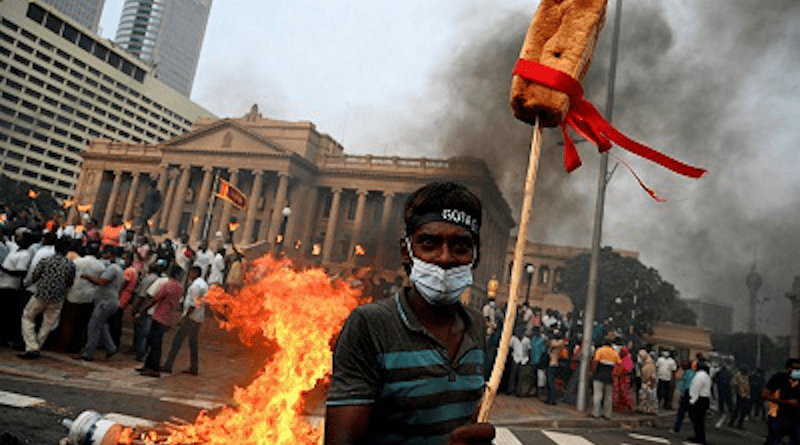In Sri Lanka It Is Now Mob Rule And Not People’s Power – OpEd
Sri Lanka is now getting huge media coverage all over the world on a scale, which is much higher than what Sri Lanka has received at any time in the past.
The media and journalists all over the world appear to be excited about the recent turn of events in Sri Lanka, where some agitators have invaded the Presidential residence without being resisted and the President leaving the residence fearing the invaders.
The journalists and political observers are interpreting the scenario in different manner, with some attributing it to the economic collapse of the nation and others terming it as an indication and trend that could happen in several other democratic countries in the world in future. Some journalists even compare the event in Sri Lanka to what happened in Capitol Hill in the USA, when some supporters of President Trump entered the building and tried to prevent the development that would pave the way for taking over by the next president. All such events are termed as sort of mob rule.
Those who call themselves as one with revolutionary ideas seem to be of the view that this invasion of the Presidential residence by people to force out the President that they do not approve of is an indication of people’s power and is the ultimate development in the evolving process of democratic system of governance.
Fortunately, the President left the residence before the invasion as otherwise, he could have been physically harmed..
It is totally wrong and absolutely counter productive to interpret the invasion of the President’s residence by a section of people as people’s power. The ground reality is that comparatively small section of country’s population took the law into their own hands and wanted to force the events in the way they want. Obviously, there should have been some motivating group behind the invaders, who organised the invasion and who believe in violence to achieve their ends and have their own agenda.
It is true that Gotabayya and his family members who were in charge of governance have been largely responsible for the economic hardships faced by Sri Lanka today. Even then, mob rule cannot be justified to force out the President in a democratic society , where there are set and civilised procedures for opposing the government and where voting out the rulers in parliament is deemed to be an appropriate procedure. The mob rule to force out the President cannot be justified and those who hail the agitators as heroes are doing a grave mistake.
It is extremely doubtful as to whether the above agitators are really angry Sri Lankans, purely for the cause of Sri Lanka. The way they entered the building , enjoyed swimming, played games, cooked food and laughed merrily and looked cheerful really indicated that they could not be the real sufferers. After the initial invasion, many others entered the building more out of curiosity and treating it as a picnic spot, particularly when they realised that police and army would not intervene.
At this juncture, it is necessary to take a dispassionate look at the turn of events in Sri Lanka and how it would affect the future governance in Sri Lanka. This turn of event has created an impression amongst general people that even a fraction of country’s population is good enough to throw out a government, if they would be adequately aggressive. If this impression would spread and prevail, the concept of democracy would go for a toss.
It is unfortunate that no media in Sri Lanka or rest of the world have condemned the agitators and their methods but have largely confined themselves to view the scenario as if it is a matter of sensation and public spectacle and as really due to economic collapse only and perhaps justifying the action of the agitators ( invaders).
The concerned people in Sri Lanka who know better should come forward and condemn this behaviour of the agitators who thought it fit to indulge in such methods to achieve their own agenda. They should tell the Sri Lankans clearly that this is not the way of establishing people’s power and this has the effect of adversely impacting the civilised politics in Sri Lanka.
If the public opinion in Sri Lanka and other parts of the world would not squarely condemn the behaviour of the mob to uproot the seat of power by violent and forceful methods instead of the civilised process of voting out inefficient and corrupt rulers, it would be a tragedy for orderly governance in a democratic country
The mob rule in Sri Lanka is a very significant event from the point of view of negativism and the way that it should not be there.
This unfortunate invasion of President’s residence has placed the Sri Lankan democracy at cross roads. While the economic issues in Sri Lanka would be hopefully sorted out soon, it appears that the political issues that it has caused could be a much more grave issue. To overcome this political issue, politicians in Sri Lanka should build themselves to better standards for the sake of the future of this glorious country Sri Lanka.

